
Media Backgrounder from the Fort Wayne-Allen County Airport Authority:
Fixed base operations at Fort Wayne International Airport
About the Fort Wayne-Allen County Airport Authority
The Fort Wayne-Allen County Airport Authority was created in 1985 and is responsible for managing Fort Wayne International Airport (FWA) and Smith Field Airport (SMD). The Authority’s mission is to provide the highest level of service to all customers while managing risk, facilitating development, providing efficient facilities, and practicing financial stewardship that contributes to the overall economic vitality of the region.
What is a fixed base operator?
According to the Federal Aviation Administration, a fixed base operator (FBO) is a commercial entity providing aeronautical services such as fueling, maintenance, storage, ground and flight instruction, etc. to the public. Typically, FBO users are general aviation users, or those who are not flying commercially on one of FWA’s airlines but choosing to fly privately for business or leisure. These passengers board their aircraft directly from the ramp at the FBO, rather than using the FWA terminal.Hundreds of FBOs exist across the country to perform a variety of services in support of both general and commercial aviation users. There are currently 69 FBOs in the state of Indiana and six FBOs in the 10-county region of northeast Indiana.
History of FBO service at FWA
After the City of Fort Wayne assumed ownership of the airport in the early 1950s, Jim Kelley created Fort Wayne Air Service. Kelley was a prominent person in Fort Wayne’s general aviation history, responding to the community’s air service needs. Fort Wayne Air Service was the leading FBO at FWA for several years. The Authority entered into a Fixed Base Operator Agreement and Lease dated January 28, 1988, with Fort Wayne Air Service, Inc. This agreement was assigned to Mercury Air Group, Inc. on April 21, 2000.In 2002 the leases were assigned by Mercury Air Group, Inc. to Mercury Air Center – Ft. Wayne, LLC (a wholly owned subsidiary of Mercury Air Centers).
In 2004 the Mercury Air Center- Ft Wayne LLC stock was sold to Allied Capital Corp. but continued to operate as a stand-alone business under Allied Capital.
In 2007, Macquarie Infrastructure Company acquired Mercury Air Centers from Allied. Macquarie already owned Atlantic Aviation and operated FBOs at 44 other airports not then serviced by Mercury. They then began phasing out the Mercury brand and replaced it with Atlantic.
A lease modernization agreement was signed October 21, 2013, between the Authority and Mercury Air Center – Ft. Wayne, LLC d/b/a Atlantic Aviation and Mercury Air Centers, Inc. as the owner of Atlantic Aviation, with them collectively known as Atlantic.
Atlantic Aviation is currently the only FBO at FWA. The last time two FBOs operated at FWA was in the spring of 2005, at which time the second FBO closed.
Atlantic’s lease agreement with the Airport Authority will expire on January 14, 2016. At that time, in support of the Authority’s mission to facilitate development and contribute to the region’s economic vitality, the FBO will be exclusively managed by the Airport Authority.
Public v. private FBO management
Transferring the FBO management from Atlantic Aviation to the Airport Authority gives the Authority full control over customer service, maintaining fair and reasonable pricing, and maximizing the region’s economic development opportunities.The Airport Authority maintains an aggressive airport development plan in conjunction with Greater Fort Wayne Inc.’s economic development team. Managing the FBO operation allows for greater flexibility and cross-utilization of economic development incentives, such as those tied to hangar rental or fuel costs.
While the Airport Authority does support third party investment in its airports, this venture will allow for the cross-utilization of airport employees and, most importantly, serve as an extension of the Authority’s brand, which includes the highest standards of safety, service, and experience.
Success at Smith Field Airport
The Airport Authority currently manages a similar, general aviation operation at Smith Field Airport on the city’s north side, where fuel sales reached a record high in 2014. Since 2008, the Airport Authority has invested over $4 million in capital improvements at SMD. Under the Authority’s direction, accomplishments have included the rehabilitation of both runways, taxi lane paving, new T-hangars, and a new terminal building and adjacent fuel farm.Several private businesses have also found success at Smith Field Airport. Sweet Aviation LLC is an Indiana limited-liability company under a contractual agreement with the Airport Authority to serve as a Specialized Aeronautical Service Operator, providing flight instruction, maintenance, and aircraft rental at SMD. Haverfield Aviation Inc., a leading provider of aerial power line inspection and construction support services, has occupied two buildings at SMD since November 2013.
In addition to private investment, the Airport Authority also welcomes partnerships that will benefit the overall health of the region’s aviation system. Ivy Tech Community College houses their Aviation Maintenance Technology Program at SMD, where students can earn the necessary certification to become an aircraft mechanic.
FBO case study: Springfield-Branson National Airport in Springfield, MO
Similar to FWA, Springfield-Branson National Airport (SGF) is home to Allegiant, American, Delta, and United, enplaning a total of 424,091 passengers in 2014, or about 100,000 more than FWA. SGF is owned and operated by the City of Springfield and overseen by an 11-member board.In addition to its commercial airport, the City of Springfield also operates the airport’s FBO. Among the 15 employees at the facility, Line Service Technicians provide aircraft marshaling, tie down service, fueling, de-icing, lavatory service, GPU service and towing capabilities, as well as ramp shuttle service. The City partners with four private businesses that also provide aircraft maintenance, charter services, sales, and storage.
The services provided at the FBO have been transferrable in that the City is also able to perform ground handling services for one of its commercial carriers. This allows for not only the cross-utilization of employees but also enhanced negotiating capabilities for the airport’s air service development team.
Springfield’s FBO management arrangement has worked in favor of the City and its general and commercial aviation users for several years. In fact, last year, the FBO had a 7.6 percent increase in aviation fuel sales and a 4.2 percent increase in the number of aircraft fueled year-over-year. This growth follows $7 million in investments made in the airport’s general aviation facilities over the last 18 months. On the commercial side, the number of available seats went up 5.3 percent compared to the nationwide average of 1.8 percent.
See also – Airport Authority to provide fixed base operation services at FWA.















